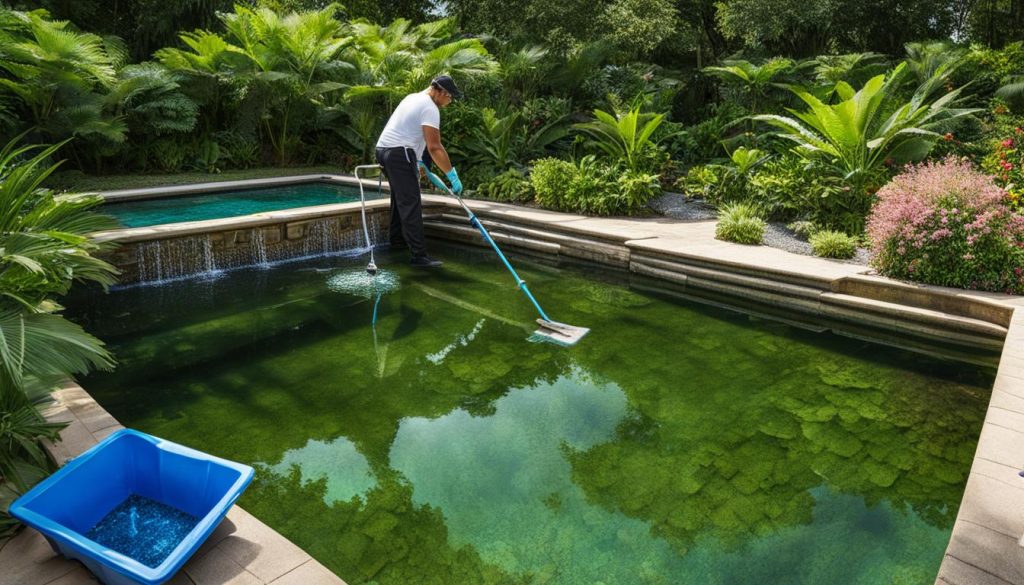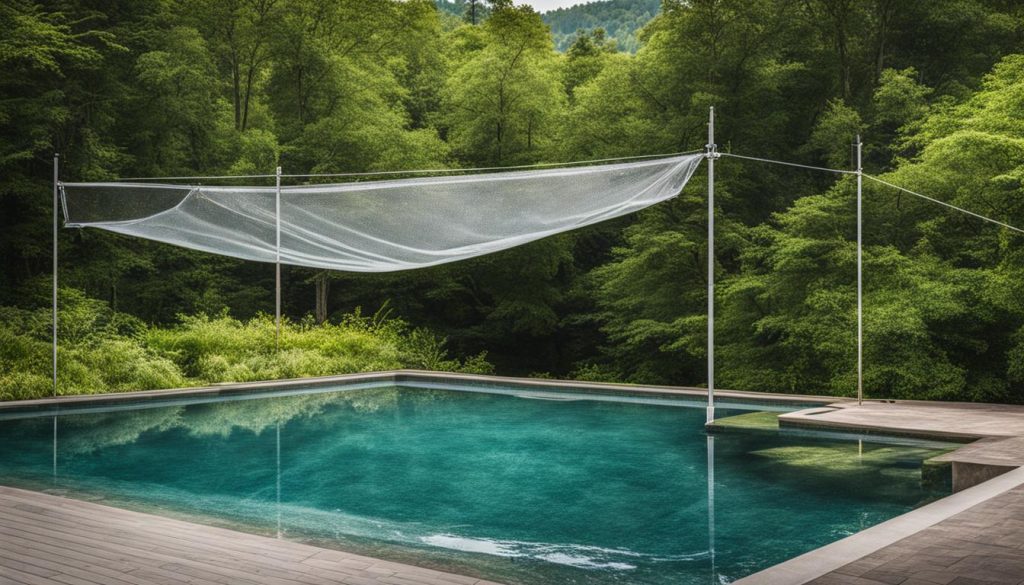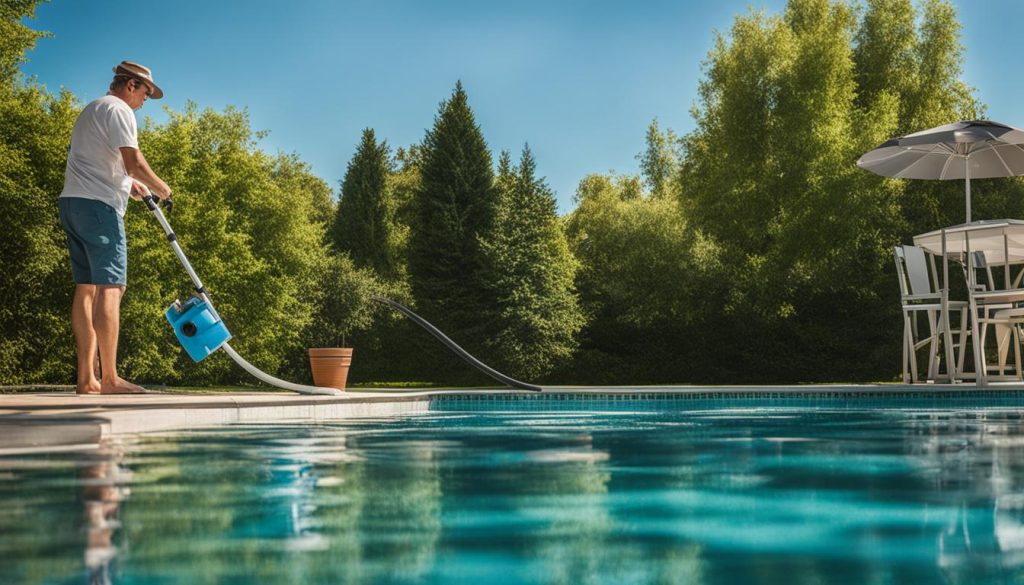As a pool owner, keeping your pool clean and well-maintained can be a time-consuming and expensive task. However, with the right DIY pool maintenance tips and techniques, you can save money and ensure that your pool is always sparkling clean and ready for use.
In this section, we will provide you with essential tips and guidance on how to take a DIY approach to pool maintenance. Whether you’re a new pool owner or have had your pool for years, these tips will help you keep your pool in top condition.
Key Takeaways
- DIY pool maintenance can save you money and time.
- Regular pool maintenance is important to prevent issues like algae growth and equipment malfunction.
- Learn basic DIY pool cleaning techniques like skimming, brushing, vacuuming and maintaining proper water chemistry.
- Be prepared to troubleshoot common pool problems like cloudy water, low water pressure, leaking pipes, and clogged filters.
- Winterizing your pool is a crucial step to prevent damage from freezing temperatures.
The Importance of Regular Pool Maintenance
As pool owners, we know that owning a pool is a significant investment that provides endless hours of summertime fun for our families and friends. However, it is crucial to recognize the necessity of regular pool maintenance to ensure that it remains a safe and enjoyable environment.
Regular pool maintenance is not just about keeping the water clean and debris-free; it is essential for maintaining proper chemical balances, inspecting and repairing equipment, and identifying and addressing potential issues before they become costly repairs.
Proper maintenance is critical for preserving the longevity of your pool, and it can prevent problems like algae growth, equipment malfunction, leaks, and surface and tile damage.
The Benefits of Consistent Pool Maintenance
Here are the top benefits of consistent pool maintenance:
| Benefit | Description |
|---|---|
| Cost Savings | Regular pool maintenance can prevent costly repairs and prolong the life of your pool equipment. Taking care of small problems as they arise is much less expensive than waiting until they become major issues. |
| Safety | Maintaining proper chemical balances and ensuring that all equipment is functioning correctly is essential for maintaining a safe pool environment for you and your guests. |
| Cleanliness | Keeping your pool clean means that it is always ready for a refreshing swim. Regular pool maintenance will prevent the accumulation of debris and algae growth, resulting in a sparkling clean pool that is inviting and enjoyable. |
| Longevity | With proper care and maintenance, your pool can last for decades. Neglecting regular maintenance, however, can lead to costly repairs and the need for an early replacement. |
As you can see, consistent pool maintenance is crucial for ensuring a safe, clean, and long-lasting pool. By committing to regular maintenance, you can enjoy all the benefits of pool ownership without the headaches and expense of repairs and replacements.

DIY Pool Cleaning Techniques
Keeping your pool clean doesn’t have to be a hassle, especially if you’re willing to take a DIY approach. By following these simple tips, you can maintain a sparkling clean pool that’s ready for use whenever you are.
Skimming the Surface
One of the easiest ways to keep your pool clean is by skimming the surface regularly. Use a net skimmer to remove leaves, insects, and other debris that float on the water’s surface. Skimming should be done every day, especially during the summer months.

Brushing the Walls and Floor
Algae and other bacteria can accumulate on pool walls and floors, and brushing them regularly can prevent their growth and make cleaning easier. Use a stiff-bristled brush to scrub walls and floors at least once a week.
Vacuuming
Debris and dirt that sink to the bottom of the pool can be easily removed by vacuuming. There are two types of pool vacuums: manual and automatic. Manual vacuums require more effort and time while automatic vacuums can be set to clean the pool without supervision. Vacuuming should be done at least once a week.
Maintaining Proper Water Chemistry
Proper water chemistry is essential to prevent algae growth and other bacterial infestations. Test your pool water regularly and adjust chlorine and pH levels as needed. Use a pool shock treatment to eliminate bacteria and other contaminants that regular maintenance can’t eliminate.
Troubleshooting Common Pool Problems
As much as we hope our pool maintenance efforts will keep everything running smoothly, we all know that problems can arise. Here are some common pool problems you may encounter and how to troubleshoot them:
Cloudy Water
Cloudy water is a common issue caused by poor water chemistry and filtration. To troubleshoot, first check your pool’s pH level, Total Alkalinity and Calcium Hardness to make sure they are within the recommended range. Then, check the pool’s filter and clean it if necessary. You can also try using a clarifier or flocculent to help clear the water.
Low Water Pressure
If you notice a decrease in water pressure, the pool’s filter may be clogged or there could be an issue with the pump. First, check and clean the filter, and if that doesn’t work, check the pool’s skimmer and pump baskets for any debris. If everything appears clear, there may be an issue with the pump and you may need to call a professional.
Leaking Pipes
If you notice water leaking from your pool’s pipes, it’s important to address the issue right away to prevent water damage. First, identify where the leak is coming from. If it’s a small leak, you may be able to fix it with a pool leak sealer. For larger leaks, it’s best to call a professional to repair the pipes.
Clogged Filters
Filters are a vital part of pool maintenance, and if they become clogged, they can cause a variety of problems. To troubleshoot, first, check and clean the filter according to the manufacturer’s instructions. If the filter is clean and still not working properly, there may be an issue with the pump or valves and you may need to call a professional.
By following these troubleshooting tips, you can save money on repairs and keep your pool running smoothly. Remember, if you’re ever unsure or uncomfortable with a repair, it’s always best to call a professional.
Tips for Winterizing Your Pool
As the temperature begins to drop, it’s essential to start thinking about winterizing your pool. Proper winterization can help you avoid costly repairs and ensure your pool is ready to use when spring arrives. Here are some tips to help you winterize your pool:
Adjust the Water Chemical Balance
Before you start the winterization process, make sure to adjust the water chemical balance. Testing the water and balancing the pool chemicals is crucial to prevent the growth of algae or bacteria during the winter. Ensure that the pH levels, alkalinity, and chlorine levels are balanced to prevent damage to the pool and equipment.
Remove the Water from Your Pool
Draining the water is a crucial step in winterizing your pool. Make sure to remove all water from the plumbing lines, filters, and pump to prevent freezing and damage to the pool’s structure. You can use a submersible pump to drain the water or hire a professional to help you with the process.
Clean Your Pool Thoroughly
It’s crucial to clean your pool thoroughly before winterizing to prevent the buildup of debris and algae during the winter months. Skim, brush, and vacuum your pool to remove any leaves, dirt, or debris that might be present. Clean the pool tiles, walls, and pool floor, and make sure to empty skimmer baskets and pool pump baskets before shutting down the system.
Cover Your Pool
After you’ve drained the water and cleaned your pool, cover it with a winter pool cover to protect it from debris and harsh weather conditions. Make sure to use a cover that fits your pool properly, and secure it tightly to prevent wind damage. You can also use water bags, pool cover clips, or a cable and winch to secure the cover.
Winterize Your Pool Equipment
Once you’ve covered your pool, it’s time to winterize your equipment. Backwash the filter and drain it of all water, remove any detachable equipment, like pool pumps, and store them in a dry, safe place. Make sure to disconnect your pool heater, drain it of water, and store it indoors to keep it from freezing.
Leveraging our substantial experience in fiberglass, vinyl, or concrete pool installation, we offer valuable tips to facilitate the winterization process and enhance the longevity of your pool. Following these guidelines ensures a smooth transition into the colder months, safeguarding your pool against potential damage. If you find yourself uncertain about any of the steps involved in winterizing your pool, it is advisable to seek assistance from a professional. Our team, with its wealth of expertise, is always ready to address any questions you may have and provide guidance tailored to your specific needs. Your satisfaction and the optimal condition of your pool are our top priorities, and we are dedicated to ensuring a seamless winterization process for your peace of mind.
FAQ
What are some essential tips for DIY pool maintenance?
Some essential tips for DIY pool maintenance include regularly skimming the surface, brushing the walls and floor, vacuuming, and maintaining proper water chemistry. These tasks will help keep your pool clean and prevent issues like algae growth.
Why is regular pool maintenance important?
Regular pool maintenance is important because it helps prevent problems like algae growth, equipment malfunction, and water imbalance. By consistently maintaining your pool, you can ensure its longevity and avoid costly repairs.
What are some DIY pool cleaning techniques?
DIY pool cleaning techniques include skimming the surface to remove debris, brushing the walls and floor to prevent algae buildup, vacuuming to eliminate dirt and particles, and regularly testing and balancing the water chemistry.
How can I troubleshoot common pool problems?
To troubleshoot common pool problems, you can follow steps like checking for cloudy water causes, inspecting and adjusting water pressure, locating and repairing leaks in pipes, and cleaning or replacing clogged filters. These troubleshooting tips can help you save money on repairs.
What are some tips for winterizing my pool?
Some tips for winterizing your pool include draining the water to the appropriate level, covering the pool with a winter cover to protect it from debris, and winterizing the equipment by following manufacturer instructions. Properly winterizing your pool will help prevent damage caused by freezing temperatures.

